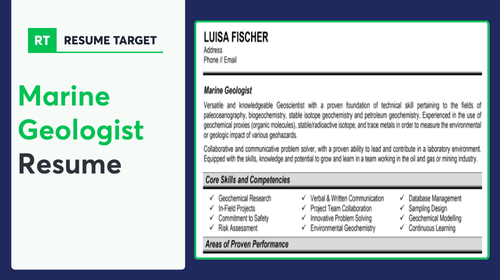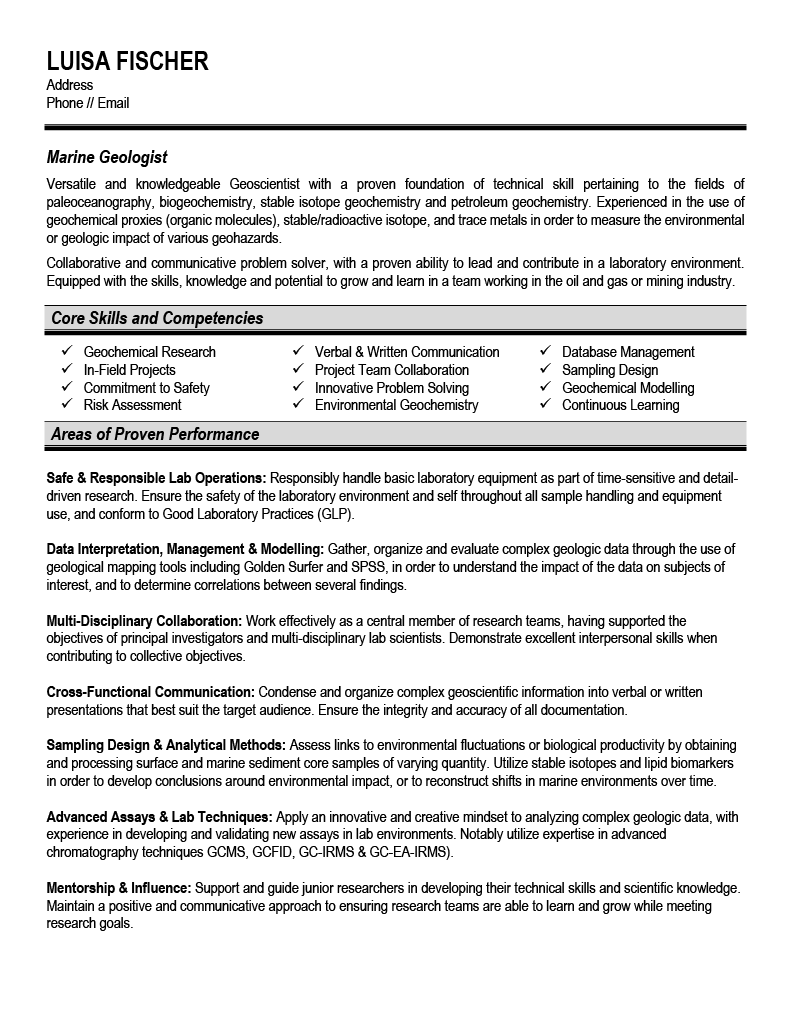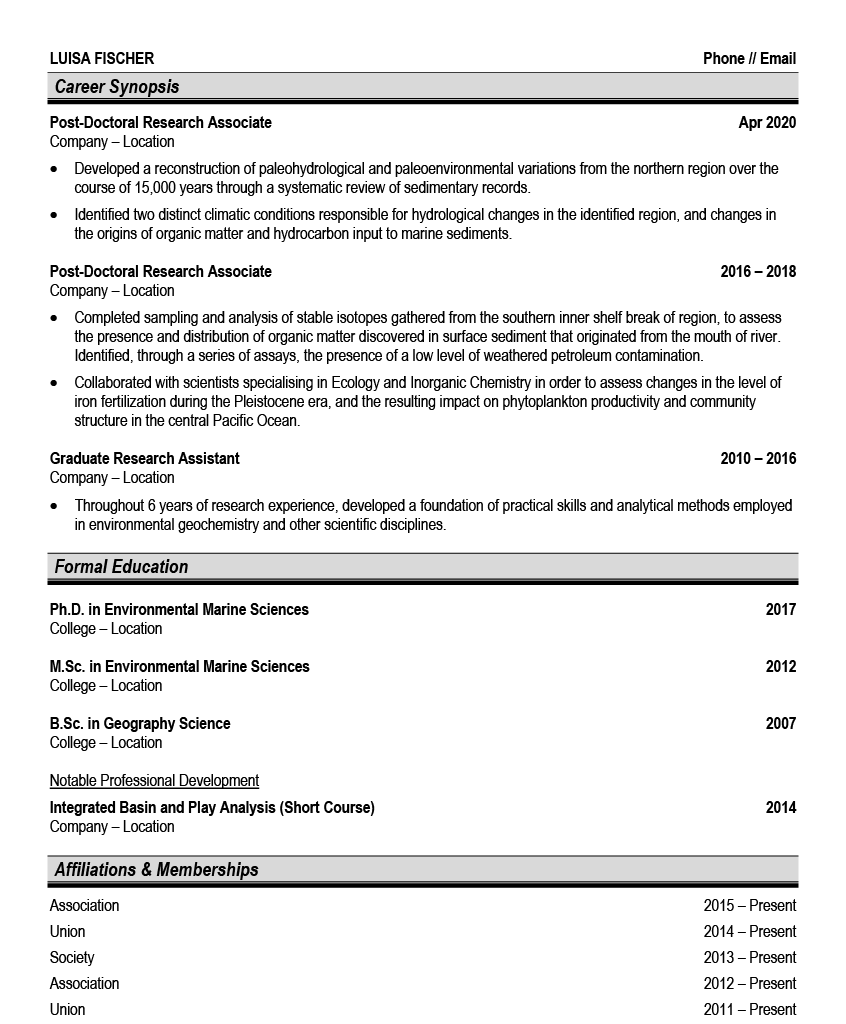

Mapping the ocean floor is complex, but writing about it shouldn't be. Many marine geologists struggle to translate their technical fieldwork into compelling resume language that hiring managers understand.
Are you finding it challenging to showcase both your scientific expertise and practical field experience? Your resume needs to bridge the gap between complex geological concepts and real-world applications that employers value.
Resume Target specializes in helping marine geologists communicate their unique value to both research institutions and private sector employers. This guide will show you exactly how to transform your underwater discoveries and technical skills into a resume that lands interviews.


While most geologists study rocks on land, marine geologists venture into the vast underwater world to unlock the secrets of our ocean floors, using sophisticated tools like sonar and remote sensing equipment to map underwater landscapes that are as mysterious as distant planets.
These underwater earth scientists combine their expertise in geology with oceanography, spending their days analyzing seafloor sediments, studying underwater volcanoes, and investigating coastal processes that shape our shorelines - all while working between ships, laboratories, and coastal research stations.
If you're fascinated by both the ocean and earth sciences, a career in marine geology offers exciting opportunities to conduct groundbreaking research, contribute to our understanding of climate change, and help protect coastal communities - let's explore how you can dive into this dynamic field.
Let's talk about what's exciting in Marine Geology careers! Your earning potential in this fascinating field can be quite impressive, with opportunities to significantly increase your income as you gain experience and specialized expertise in studying ocean floors and marine environments.
Figures from: U.S. Bureau of Labor Statistics
Marine Geologists can advance from field researchers to leading global oceanographic projects. With the right education and experience, you can progress from analyzing seabed samples to directing major marine research initiatives.
Beyond basic geological knowledge, advancing in marine geology requires mastery of advanced technical skills like GIS mapping, geochemical analysis, and remote sensing technology, combined with strong leadership and project management abilities.
Breaking into marine geology starts with combining your passion for ocean science with specialized education, as employers typically seek candidates with advanced degrees in marine geology or related fields.
To build your career foundation, you'll need to develop expertise in geophysical analysis and remote sensing technology, while gaining hands-on experience through research assistantships, internships, or entry-level field positions.
• Research Assistant • Marine Survey Technician • Environmental Consultant • Laboratory Technician • Field Data Collector • Junior Geologist • Marine Science Technician • GIS Specialist • Oceanographic Assistant • Environmental Monitoring OfficerRequirements from University of Miami Bulletin
From coastal hubs to research centers, Marine Geologist roles span both government and private sectors nationwide.
Figures from ZipRecruiter
Struggling to translate your complex fieldwork, research projects, and technical expertise into a compelling marine geologist resume that catches an employer's attention? This comprehensive, section-by-section guide will show you exactly how to showcase your geological expertise, research contributions, and field experience in a way that resonates with hiring managers.
Like mapping complex ocean floors, crafting the perfect resume summary can feel like navigating uncharted waters when you're trying to condense years of field experience, research, and technical expertise into a few impactful sentences.
While you excel at analyzing seabed formations and interpreting geological data, translating your deep understanding of marine processes and research capabilities into compelling career highlights requires a different kind of precision - one that helps hiring managers quickly recognize your potential to contribute to their oceanographic projects.
How would you describe your unique blend of geological expertise and marine science experience that sets you apart in the field of marine geology?
Reason: This helps you articulate your distinctive professional identity and immediately shows employers your core value proposition as a marine geologist. It encourages you to think about what makes your combination of skills unique in the field.
What are the primary areas of marine geological research or exploration that have shaped your professional focus and expertise over your career?
Reason: This question helps you identify and articulate your specialized areas within marine geology, whether it's seafloor mapping, coastal processes, or marine mineral resources, allowing employers to quickly understand your professional focus.
How would you characterize your approach to combining field research, technical analysis, and environmental considerations in your work as a marine geologist?
Reason: This prompts you to highlight your methodology and thought process, showing potential employers how you balance the various aspects of marine geology work. It helps demonstrate your holistic understanding of the field's requirements.
As a Marine Geologist, your skillset spans from sophisticated seafloor mapping techniques and geological sampling methods to complex data analysis and research vessel operations.
Your resume needs to showcase both technical expertise like bathymetric surveying and seismic interpretation, alongside practical field skills such as core sampling and ROV operation.
Showcase your expertise in oceanic research and seafloor analysis by organizing your experience into three powerful sections: a compelling role overview that sets the context, quantifiable achievements that highlight your research impact, and core responsibilities that demonstrate your technical and analytical capabilities.
Many Marine Geologists struggle to translate complex scientific research and technical fieldwork into clear, business-focused accomplishments that hiring managers can quickly grasp. Transform your underwater discoveries and geological analyses into powerful metrics by connecting your research outcomes to environmental impact, resource identification, and risk mitigation success rates.
The responsibilities section demonstrates how Marine Geologists contribute to understanding ocean floor dynamics and marine resources. Your duties should clearly show how your technical expertise connects to broader environmental research, resource exploration, and marine conservation efforts.
Your advanced education and professional certifications are crucial for demonstrating expertise in marine geological studies and oceanographic research. Focus on highlighting your highest academic achievements in geosciences and any specialized certifications in marine surveying, seabed mapping, or underwater geological assessment techniques.
Now that you've built a strong foundation using Resume Target's expert guidelines, you're ready to transform your base resume into a powerful tool for landing your ideal marine geology position.
While many candidates stop at customizing their cover letter, successful marine geologists know that personalizing their resume for each position is what truly sets them apart in this specialized field.
By carefully aligning your experience and skills with each job description, you'll not only sail through ATS screenings but also demonstrate to hiring managers that you understand the specific geological survey, research, or consulting role they need to fill.
Ready to make waves in your job search? Let's turn your marine geologist resume into a precision instrument that charts a course straight to your next career opportunity!
Don't let a lack of professional experience hold you back from pursuing your dream career as a Marine Geologist!
Your academic background in geology, oceanography, and marine sciences, combined with research projects and field work experience, can create a compelling story for employers.
Focus on highlighting your technical skills in geological sampling and analysis, any research vessels experience, and relevant coursework or thesis work.
For more guidance on structuring your academic achievements and research experience, check out the Student Resume Writing Guide to create a standout application.
Your summary section is your chance to showcase your specialized geological education, research projects, and fieldwork experience that make you an excellent candidate for marine geology positions.
Focus on highlighting your technical skills, laboratory expertise, and any underwater mapping or marine sampling experience you gained during your studies.
"Detail-oriented and research-focused Marine Geologist with comprehensive academic training and hands-on experience in oceanographic surveying and seabed mapping. Proficient in GIS software, sediment analysis, and marine sampling techniques through multiple research expeditions. Demonstrated ability to collect and analyze geological data using state-of-the-art equipment and modeling software. Seeking to leverage strong analytical skills and passion for marine sciences to contribute to coastal research and underwater geological exploration projects."
Now's your chance to showcase the specialized academic training that makes you a standout marine geologist - from advanced oceanography coursework to hands-on research experiences!
Don't just list your degree - highlight those key marine geology projects, underwater mapping exercises, and sediment analysis labs that demonstrate your technical expertise and research capabilities in marine environments.
Insufficient data available despite thorough search.Relevant Coursework: Marine Sedimentology | Oceanography | Geophysical Mapping | Marine Geochemistry | Coastal Processes | Marine Survey Methods
Key Projects:
Seafloor Mapping Project: Conducted comprehensive bathymetric survey of coastal shelf region to analyze sediment distribution patterns and identify potential geological hazards.
Marine Core Analysis Study: Led a team research project analyzing deep-sea sediment cores to reconstruct paleoclimatic conditions and understand historical oceanic changes.
Leverage your academic background, research experience, and technical training by showcasing the specialized skills you've developed through coursework, fieldwork, and laboratory studies to create a compelling marine geology resume that catches employers' attention.
As an entry-level Marine Geologist, your combination of technical skills and scientific knowledge positions you well for exciting opportunities in ocean research, environmental consulting, and marine resource exploration, where demand for qualified professionals continues to grow.
When you're deep in the world of bathymetric mapping and seafloor analysis, it can feel impossible to translate your specialized underwater expertise into language that resonates with hiring managers while still maintaining technical accuracy.
At Resume Target, we've mastered the art of showcasing marine geology expertise, helping professionals like you transform complex oceanographic research and technical fieldwork into compelling career stories.
Our deep understanding of the geology industry means we know exactly how to position your experience with seabed sampling, marine surveys, and underwater geological formations in ways that catch attention.
With increasing focus on ocean resource exploration and marine conservation, there's never been a better time to refresh your professional story - let's connect today to craft a resume that makes waves in your job search.
Impress any hiring manager with our Geology resume writing service. We work with all career levels and types of Geology professionals.
Learn More → Geology Resume Writing Services